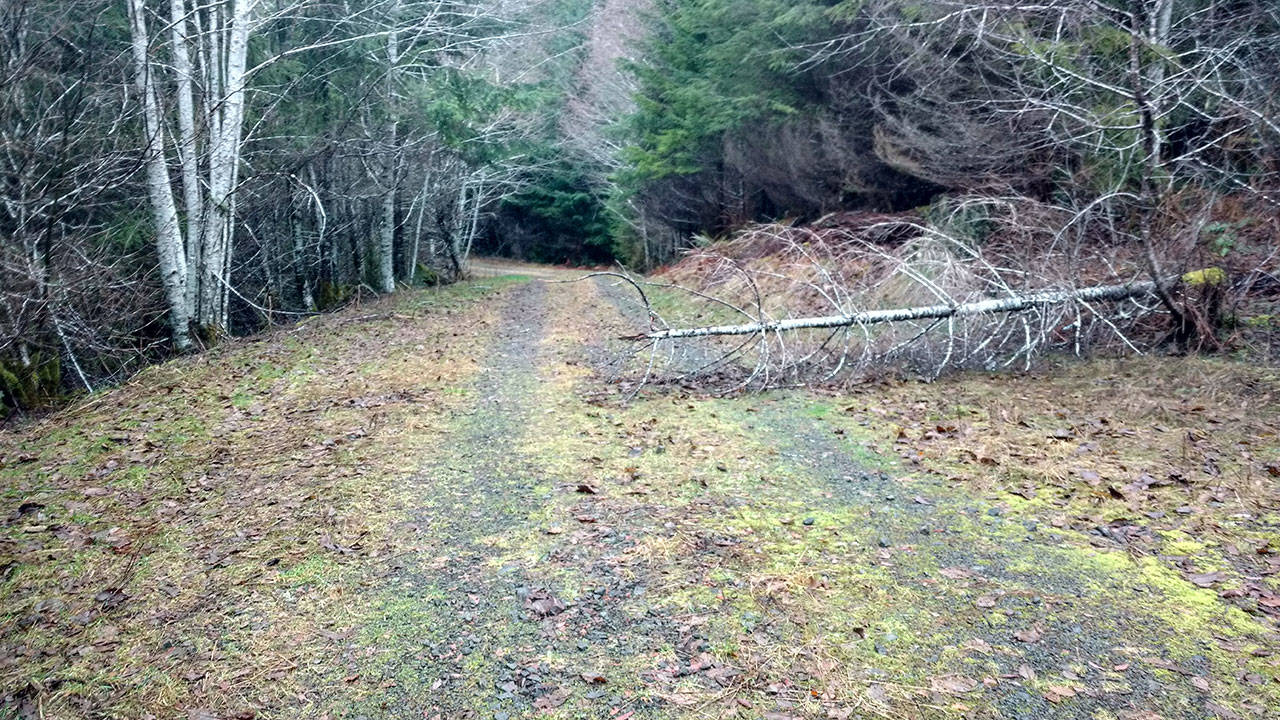WHEN THE WINDS on the West End violently abuse the forest, trees fall.
It’s natural and generally no big deal.
However, when trees fall across the road or trail, users are faced with a decision: turn back, climb over, walk around or, if possible, cut the tree out of the way.
Removing the mess for oneself and those to follow seems the ideal choice.
Yet that creates a sticky situation.
What does the owner or manager of the land think?
Dean Millett, U.S. Forest Service ranger, Pacific District says, “We prefer they not do anything.”
He cites safety as a concern and adds, “A lot of people are well meaning and have good intentions, but they could cause resource damage.”
Millett explains there are employees and volunteers who maintain trails for public use.
Most trail users understand some of the complexities of having the public use anything that belongs to someone else.
As time marches on, though, how long does one wait for the powers-that-be to fix the situation?
This is where renegade volunteers come into play.
These men and women keep roads and trails open and very often use chainsaws to do it.
Power tools in the hands of uncertified “volunteers” make landowners cringe, in part for liability’s sake.
I’ve opted not to print renegade names to protect the innocent, or guilty. It depends on one’s viewpoint.
“It’s easier to beg forgiveness than to ask permission,” is frequently said by one renegade who has been taking matters into his own hands for years.
Like him, many who use public lands on the West End are very familiar with chainsaws.
After a while, it becomes difficult to wait for something to happen when one has the skill, time and tools to do the job themselves.
“The way I see it, the public lands are paid for by ‘we the people,’ maintained with our tax dollars and the agencies receive money from me for buying a firewood permit; they ought to thank me for keeping their roads open,” said another renegade volunteer who doesn’t even want the green wood so often found laying across the road.
For firewood, he is after the drier snags that possibly lie up the road and past the trees blocking said road.
Some renegades just get tired of clambering over trees, waiting for foot trails to be opened up.
Speaking to one, they said “I just put my saw in the trunk, drove out to Third Beach and spent about 45 minutes opening up the trail.”
That is a lot of volunteer time and sweat to go generally unappreciated by land managers.
In cases where trees are not moved in a reasonable amount of time, the trail or road shifts because users go around the mess.
This gets confusing because agencies such as Olympic National Park stress the importance of staying on the trail so the natural habitat is not damaged by repeated foot traffic.
But when trails are left cluttered and impassable, most find a way around the mess that certainly encroaches on the pristine forest floor.
Millett gives an example of a difficult situation south of Forks.
“The Bogachiel River Trail got washed out by the river and it’s taken a lot longer to get it rerouted than we would like,” he said.
He said in the meantime, some folks have both built a bridge over a creek and bucked some trees on the river bank.
He says, “The bridge disrupts the coho habitat because the small fry need the calmer off-channels because it gets too rough in the main channel.”
He also explains the bridges the Forest Service constructs are to a certain standard of safety.
As for the bucked trees, the renegade in this instance didn’t do the work in the riparian zone with enough foresight and Millett says the way the trees were cut will cause the bank to keep sloughing away.
“It’s not a big hurdle to become a volunteer, just come in and talk to us,” Millett urges, adding that the Forest Service encourages people to work with a group such as Backcountry Horsemen of Washington or Washington Trails Association.
By belonging to a group, he believes the odds of a volunteer being out in the forest alone hopefully decreases and their safety increases.
Joining groups is fine for some, but most of the renegades I know just aren’t that type.
They like to be in the forest, working alone or with a close friend, maybe working with a beer on the tailgate next to the saw gas and bar oil, just enjoying the outdoors and the work.
_________
Zorina Barker lives in the Sol Duc Valley with her husband, a logger, and two children she home-schools.
Submit items and ideas for the column to her at zorina barker81@gmail.com, or call her at 360-327-3702. West End Neighbor appears in the PDN every other Tuesday.
Her next column will be Feb. 20.

